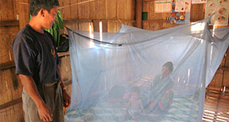 On April 25, people around the world participate in many activities to celebrate World Malaria Day 2015. For half the world’s population at risk of contracting the disease, every day is the World Day of Malaria, a day to focus actions to combat this deadly disease. This is an opportunity to share information with civil society, to engage in dialogue, contribute with ideas and events to mobilize the world in the fight against malaria.
On April 25, people around the world participate in many activities to celebrate World Malaria Day 2015. For half the world’s population at risk of contracting the disease, every day is the World Day of Malaria, a day to focus actions to combat this deadly disease. This is an opportunity to share information with civil society, to engage in dialogue, contribute with ideas and events to mobilize the world in the fight against malaria.
The date was set and approved at the 60th World Health Assembly in March 2007, replacing the Malaria Day in Africa, celebrated every year on April 25th since 2001. On this day, advocates and citizens around the world work to raise awareness about malaria as a preventable and treatable disease, and mobilize action to reduce the huge social and economic burden that it represents.
Malaria is caused by a parasite called Plasmodium, which is transmitted through Anopheles mosquito bites infected. In the human body, the parasites multiply in the liver, and then infect red blood cells. More than 100 species of Anopheles that can transmit malaria are known, but only 30-40 commonly transmit the parasite in endemic regions. Anopleles gambiae is best known for its role in the transmission of the species most dangerous parasite to humans, Plasmodium falciparum.
BIREME/PAHO/WHO recommends access to documents and scientific and technical information sources on the Virtual Health Library related to the World Malaria Day 2015.
Related links